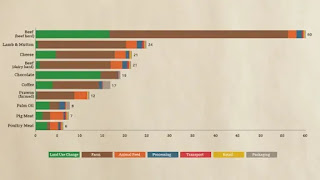I've been vegetarian for 40-odd years, since long before it was trendy and socially acceptable. But I'm also still open to learning, so when I saw a BBC article entitled "The climate benefits of veganism and vegetarianism", I was immediately interested. Climate change considerations are far from the only reason I am vegetarian, but they are certainly one reason. I expected the BBC study to confirm my preconceptions, but I was also there for the nuances, and yes, there were nuances.
Part of the point of it was to look at the whole life-cycle carbon impact of food, from land use and farm costs, to animal feed, processing, transportation retail and packaging, which is not that easy to do. The graph below gives a general idea of the relative carbon costs of some general food categories (although there are, of course, particular variations bending on specific food types, sourcing, etc).
As is pretty well known, beef is far and away the main offender, followed by lamb. But cheese, still a weakness of mine, is also surprisingly high on the list (mainly due to its farm aspect - all those cows...) and pork and chicken are surprisingly light on carbon emissions (presumably because of the factory farming set-up, a whole other issue not considered here). Another graphic from the article gives an even more stark view of the relative differences:
Anyway, the whole article is well worth reading (and the original Our World In Data website that the graphs come from). The overall conclusion is, as expected, that a vegan diet is far and away the best for the planet, and the omnivore diet the worst, with a vegetarian one somewhere in between, but much closer to the good end than the bad. The example vegan diet produced 9.9 kg of CO2e (carbon dioxide equivalent) per week, the vegetarian 16.9 kg, and the omnivore 48.9 kg.
As for nuances: the transportation element of food production contributes a surprisingly small proportion of the whole (so, those holier-than-thou 100-mile diets are not actually making much of a difference, and I can still eat mangoes and avocados without an ethical breakdown); wasting (i.e. not eating, but just throwing away) food adds a substantial amount of greenhouse emissions, unless the wasted food can be composted (whew!); cooking food in an oven also adds significantly to the emissions profile, and eating out in a restaurant may often be a good climate option (except not fast food).
I think 40 years as a vegetarian - and bringing up a vegan daughter who is way more carbon-conscious than even we are - has earned me some major brownie points, if anyone is counting. Unfortunately, no-one is counting, and that's part of the problem.


No comments:
Post a Comment